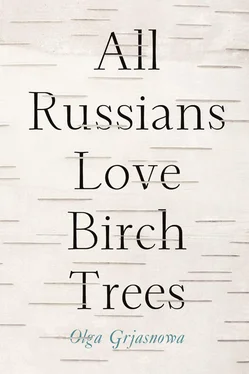Ismael lit another cigarette.
“My parents were Communists, too,” I said.
“You know, when I was a kid, I always had to recite the Communist Manifesto as a punishment,” Ismael said and laughed.
“Shit.”
“Exactly. But now my father’s into religion. Prays five times a day and is on the lookout for a second wife. My mother is still a Communist. She even ran in the last election. There were posters with her name and face all over the city. A great honor. My father told everyone he wouldn’t vote for her. And he didn’t.”
“Did she win?”
“Who’s going to vote for you if not even your husband will?”
We were silent for a while.
“You know, I went to Germany once. Good country, but they won’t let you smoke anywhere. I missed Palestine. As soon as I got back I lit a cigarette. I hadn’t even left the bus.”
Ismael was steering with only one hand. In the other he held a cigarette.
“But one thing I still don’t get,” he said. “Why did your father marry a Jew?”
“He just fell in love.”
Ismael grinned at me for a moment too long.
“What do you believe in?” he asked.
“Nothing.”
“God?”
“No.”
“Culture?”
“Nope.”
“Nation?”
“You know, when I was a kid everyone kept a packed suitcase. Precautionary measure. With us, it was my grandfather’s old briefcase. In it there was fresh underwear, family pictures, silver spoons, and gold crowns — the capital they were able to accumulate in a Communist regime. The Armenians had already been driven out of the city. Many were executed. My grandma, who had witnessed the Shoah …”
“OK, I got the hint!”
By the time we passed the sign that said it was three miles to Jenin, we were already in the city.
“This area was the hardest hit during the second intifada,” Ismael said. “In 2002, the Israeli army invaded the refugee camp.”
“Following an attack by Hamas,” I pointed out.
“Yes, following an attack by Hamas. Multiple attacks even. Listen, I don’t want to sugarcoat or sanctify anything. I just want to tell you how it was.”
“Sorry.”
“So, do you want me to continue?”
“Yeah, of course.”
“For days, there were street battles. Until they came with bulldozers. They plowed through everything, even the houses with people in them. In the end, we couldn’t tell what was a dead body and what was an animal cadaver. When they finally left, everything was silent. Even the air. Especially the air. It had stopped circulating. The smell of drying blood everywhere. All I smelled was the scent of decay, and even though I’d gotten through it with only a flesh wound, I felt dead. I was certain I would die before too long. I had taken on that scent.”
The refugee camp was a village with narrow streets. I hadn’t noticed the transition between the city and the camp. We stopped in front of a whitewashed house and the parking brake clicked into place.
“We can’t kiss or hug,” Ismael said, despite the fact that — up to this point — we hadn’t even touched. Not even an accidental brushing of clothes. The driver’s door opened and slammed shut. I took a deep breath, then exited the car.
“By the way, my cousin’s getting married,” he said.
“Why didn’t you tell me?”
“Because then you might not have come. I should also mention that I have three sisters and two brothers, not to mention dozens of cousins, aunts, uncles, and nephews.”
And as soon as we neared the house, twelve women came out, smothering Ismael in kisses and hugs. He introduced a small, delicate woman to me as his mother. Then he disappeared in the yard and I was interrogated. Some women wore a hijab, others didn’t. I said that I was an international peace activist, which settled the matter: this kind of woman was not uncommon in Palestine and nobody asked about my stance on Ismael.
One of Ismael’s sisters led me up a steep spiraling staircase. I had to hold on to the handrail. Haifa was the youngest sister. She had curious dark brown eyes and full lips. Her shiny dark hair fell over her shoulders, reaching down to her waist. Haifa sat me down on her bed and started to give me a makeover. She straightened my hair, trimmed my eyebrows with a piece of thread, applied makeup and perfume. The dress she lent me was light blue.
“You’re beautiful,” Haifa said as we both regarded her work in the mirror. “But when we meet the others, you probably shouldn’t mention that you’re a peace activist.”
“Why not?” I asked.
Embarrassed, she looked to the floor. “Well, we’re kind of fed up with peace. We want rights and a state. The peace process is a failure and we don’t want normalization.”
“But I already told everyone.”
“Doesn’t matter, just don’t repeat it. And, besides …” Here she paused, averted her eyes.
“Yes?”
“Ismael has already had enough trouble lately,” she said in a firm voice.
I didn’t inquire further, because it wasn’t any of my business and because I was sure she’d tell me anyway. But to my surprise, her expression turned to anger and she yelled, “I don’t understand you people! You come here as volunteers and think that you can do what you want because you’re so nice. So awfully nice. You don’t give a shit about us. Our role is simply to suffer and install your air conditioners.”
I stared at her. Haifa nodded and continued: “But oh well. He brought you here, now you’re our guest. I’m sorry. It’s just that normalization is the wrong way. We have to strengthen the resistance against the occupation and not play into its hands. You Germans, you’re so naive.” Somehow her explanation rang false. I could tell she wasn’t speaking her mind, but couldn’t quite place the dissonance.
Haifa took me by the hand and led me into the living room to the other women. The men were outside in the garden celebrating.
The bride was made up like a doll and surrounded by women. Whoever wasn’t dancing was clapping along. The music was loud and the air full of heavy scents. Everyone had taken off their coats and hijabs. I caught a glimpse of myself in the mirror. Blue dress. The music was deafening and outside it was still day.
I went out onto the street that smelled of sewage. Somewhere a chicken squawked. I walked through the narrow alleys. On the walls hung posters of prisoners doing time in Israeli prisons and of suicide bombers with the specifics of their date of death. Between them hung ads. I kept noticing swastikas everywhere I went. I thought of the Caspian Sea, of the pleasure boats and Rostropovich. I wanted to go home. Back to my mother. Wanted her to protect me. Back to Elisha, to clasp his shirt, breathe in his smell, see his face clearly in front of me again. I had goose bumps that refused to go away and a rising sickness inside me. I tried to rest, leaned against a wall to gather energy. My nose bled. A small boy passed me on his bike. He rung the bell and yelled something, but his voice was distorted and I didn’t understand. After a while he gave up and biked on. I noticed that I was standing next to a butcher shop. Entire cadavers hung in the shop window, upside down on a silver hook. Next door was Café Baghdad. In their window hung a profile shot of Saddam Hussein. I walked toward it, reaching out for it, pressing my hand against the cold window.
“Saddam, you again,” I said. “Do you remember the name of the redheaded boy? The one from the park?”
No answer. Saddam was dead. Elisha was dead. Everything was dead. The Days of Sacrifice. My father hung blankets over our windows because the soldiers shot like moths fly: always into the light. An unnatural silence hung over the city. Dark clouds covered the sky, as if to muffle every sound. My father wore his black coat. A duffel bag hung over his shoulder. My mother had quickly packed my things: thick wool socks, dresses, pullovers. She quietly cried as she did so. Buttoning my coat, she looked at me, then she removed my necklace with the Star of David, which I had worn since I was three. I protested but she said that this wasn’t the time for it. Go. My father pulled me after him. There were hardly any people on the street. In front of some houses lay smashed furniture, slit mattresses, random pieces of clothing. Windows were shattered, broken glass littered the cobblestones, mingling with pieces of random family photos.
Читать дальше












